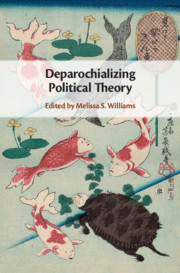Book contents
- Deparochializing Political Theory
- Deparochializing Political Theory
- Copyright page
- Dedication
- Contents
- Tables
- Contributors
- Preface and Acknowledgments
- Note on the Text
- 1 Introduction
- 2 Deparochializing Political Theory and Beyond
- 3 Recentering Political Theory, Revisited
- 4 A Decentralized Republic of Virtue
- 5 Deparochializing Political Theory from the Far Eastern Province
- 6 Is Popular Sovereignty a Useful Myth?
- 7 Authoritarian and Democratic Pathways to Meritocracy in China
- 8 Deparochializing Democratic Theory
- 9 Teaching Comparative Political Thought
- 10 Teaching Philosophy and Political Thought in Southeast Asia
- 11 Why Globalize the Curriculum?
- Index
2 - Deparochializing Political Theory and Beyond
A Dialogue Approach to Comparative Political Thought
Published online by Cambridge University Press: 15 March 2020
- Deparochializing Political Theory
- Deparochializing Political Theory
- Copyright page
- Dedication
- Contents
- Tables
- Contributors
- Preface and Acknowledgments
- Note on the Text
- 1 Introduction
- 2 Deparochializing Political Theory and Beyond
- 3 Recentering Political Theory, Revisited
- 4 A Decentralized Republic of Virtue
- 5 Deparochializing Political Theory from the Far Eastern Province
- 6 Is Popular Sovereignty a Useful Myth?
- 7 Authoritarian and Democratic Pathways to Meritocracy in China
- 8 Deparochializing Democratic Theory
- 9 Teaching Comparative Political Thought
- 10 Teaching Philosophy and Political Thought in Southeast Asia
- 11 Why Globalize the Curriculum?
- Index
Summary
In this chapter, James Tully takes us deep into the phenomenology of the kind of dialogue across traditions that is capable of disrupting the unjust power structures that currently connect diverse traditions in the modern global order. He contrasts “genuine dialogue,” in which traditions have equal status as forms of human understanding, with the many kinds of “false dialogue” that are likely to emerge under circumstances of unequal power and power-knowledge. As beings that make sense of the world through our received traditions, we tend to project onto others the terms that make the world meaningful to us. Deparochializing our political thought must begin by “reparochializing” it, recognizing that the truths we hold to be self-evident have arisen within a sociohistorically specific context. The “deep listening” required for genuine dialogue requires practices of the self that must be cultivated over time before dialogue can generate reciprocal elucidation and transformation. When we succeed, participants in this dialogue can achieve not only mutual understanding but also the possibility of bringing to light ways of “thinking, judging, deliberating, and acting together in response to the situation they share that were unimaginable and unthinkable prior to the dialogue.”
Keywords
- Type
- Chapter
- Information
- Deparochializing Political Theory , pp. 25 - 59Publisher: Cambridge University PressPrint publication year: 2020
- 6
- Cited by



